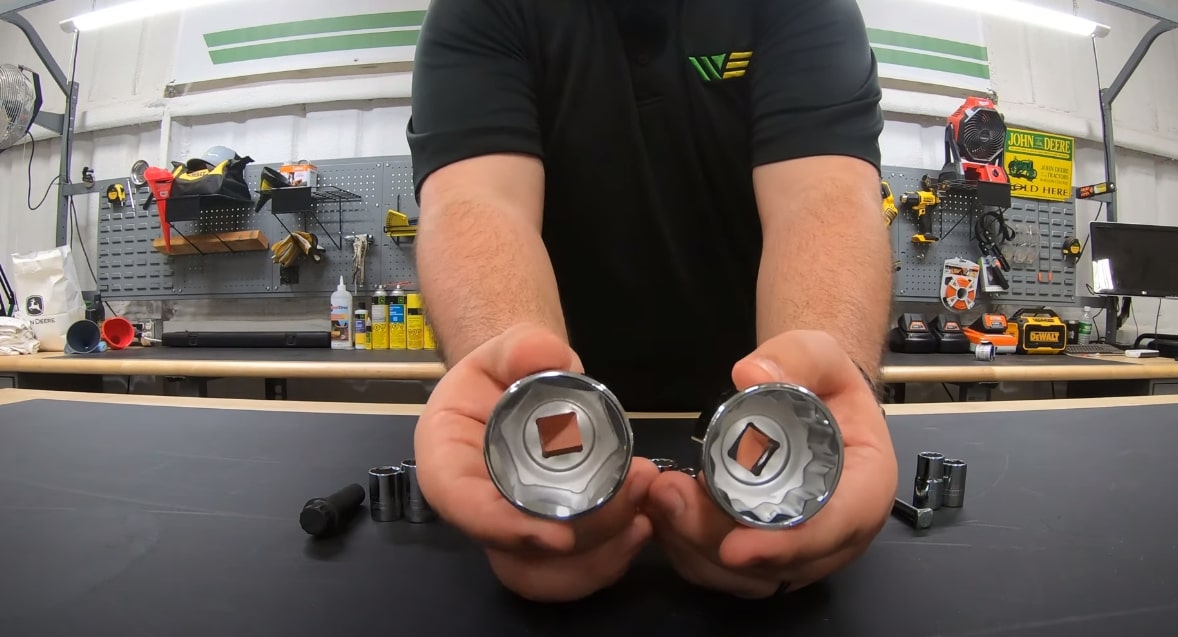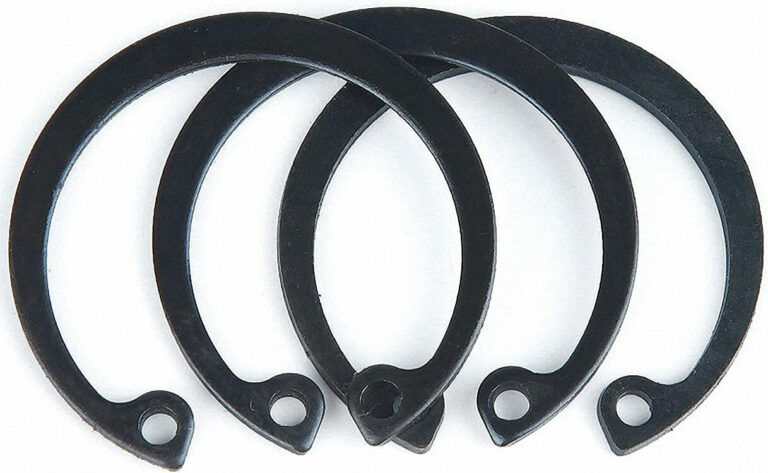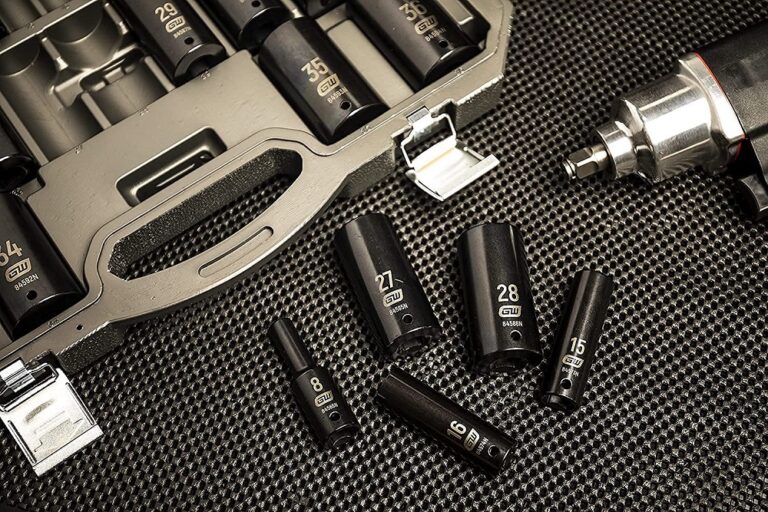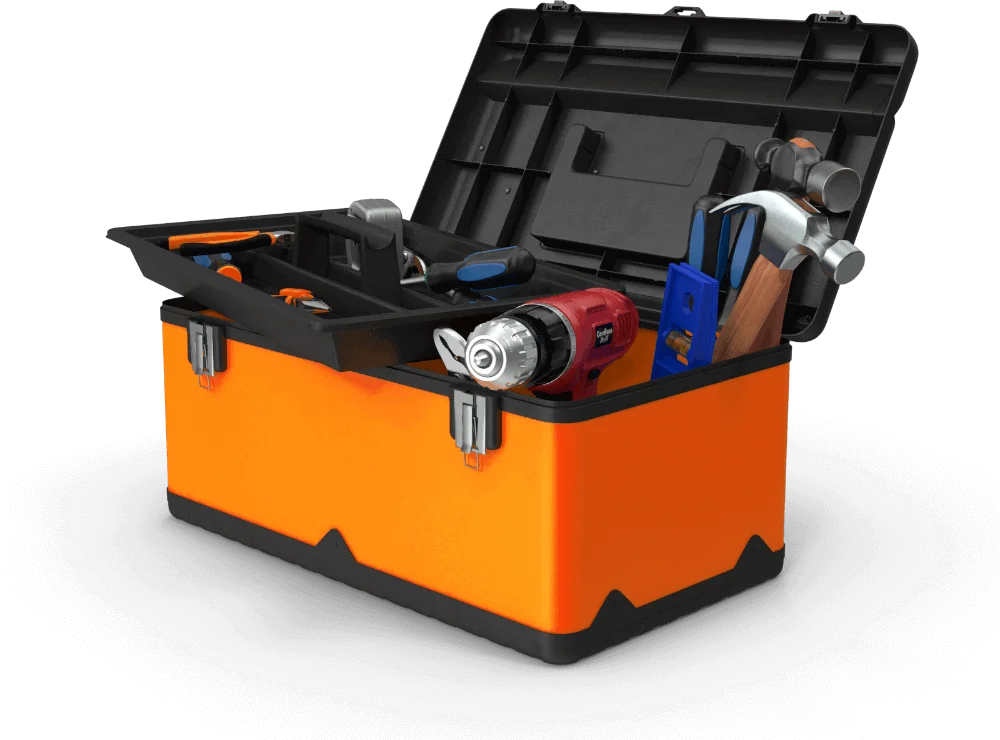6 Point vs. 12 Point Sockets – Which One Do You Need and What is The Difference
Not sure which point of sockets to use for nuts and bolts tightening?
We know there are sockets and wrenches to the nuts and bolts tightening issue. But not all the sockets are suitable to use for tightening or loosening. 6-point and 12-point sockets are largely available in the market. But which one should work perfectly on different sorts of fasteners?
Find out the 6-point vs. 12-point sockets differences in the later section.
What is the point of sockets
Points of sockets let you connect easily with the heads of fasteners. More point lets you connect to the tighter space that is hard to observe. For example, the 12-point sockets allow you to connect to the fastener at more angles with more tight spaces. Less the points more force it requires to connect, like the 6-point sockets.
6 Point vs. 12-point sockets – What’s better? Which Should You Use?
Sockets mainly do the loosening or tightening fastener while turning them at the same time. But which of the sockets point would perform better? 6-point sockets need more force, while 12-point can be placed in tight spaces. Are 6 or 12-point sockets better? Does 6 point socket vs. 12 point socket do it best? Let’s find out.
How is 6-point sockets
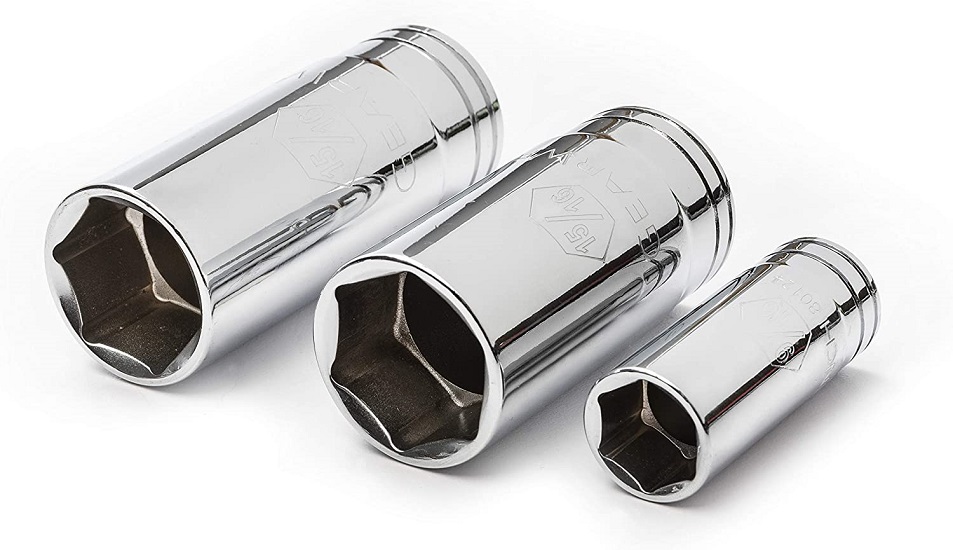
6-point sockets include 6 points or angles inside the bolt, and it has thick walls. 6-point sockets generally need more strength or force to unhook or hook the sockets. As you can use the 6-point sockets for removing lug nuts from the tire with a lot of force, it is a beneficial socket for using on a fastener. The 6-point sockets have more advantages as they have more torque and stripping combatting.
Who is it for?
6-point sockets are beneficial for your work if your jobs require a large amount of force. The contact surface with the flat edges makes it less slippery. So it grips the fasteners more strongly. Generally, 6-point sockets are used in high-torque applications, and the impact sockets are mostly based around 6-point sockets.
What is the purpose of 6-point sockets?
The 6-point socket design is very much intuitive and work-friendly, so this socket can easily contact the head of a fastener from the corners, and the thickest part of the fastener makes contact at ease. This reduces the slipping issue and rounding over the edge.
The advantages and disadvantages of a 6-point socket
When you want to use the socket for nuts and bolts, you may find some inaccuracies while using the 6-point sockets. On the other hand, 6-point sockets have more advantages than disadvantages. Below, find the advantages and disadvantages of 6-point sockets.
Advantages:
Torque Force: The 6-point socket can easily generate a lot more force. Whether you want to remove the tire or remove the rusted bolt, you need more torque. The 6-point socket is there to deliver more torque.
Slipping Prevention: 6-point sockets have an additional contact surface that has additional strength as the thick walls are designed very intuitively. The thick walls help lessen the socket’s flex and prevent it from slipping.
Durable and Highest Productivity: The 6-point socket can endure the highest tension or force and is durable at its best. But if you use the wrong tool and provide extreme tension or force, those thicker walls may break anytime.
Disadvantages:
Inadequate Angles: 6-point sockets have insufficient angles for positioning the socket onto the fastener. If you use the breaker bar without a ratchet, you must position the socket on the bar and the fastener to get a proper position.
How is 12 point sockets
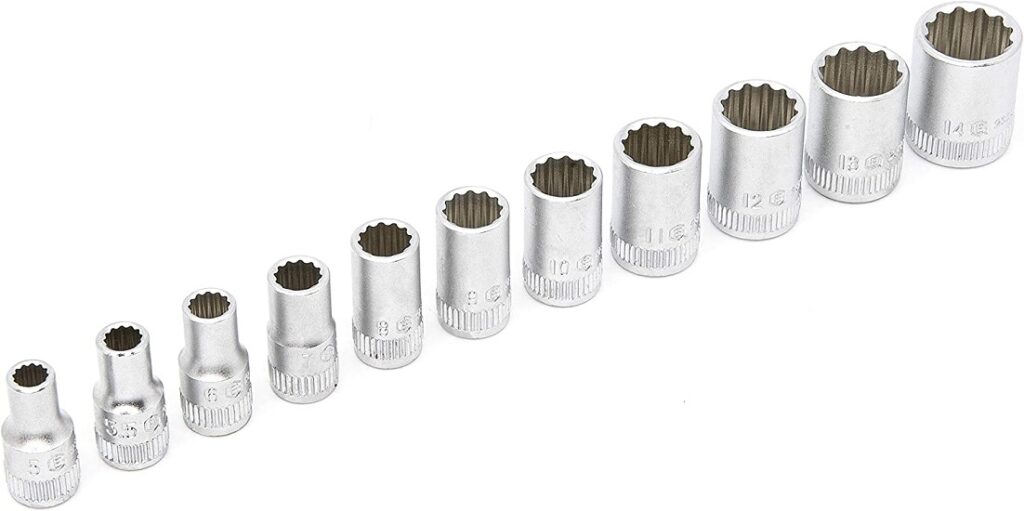
The 12-point sockets are easier to connect with the head of fasteners. This type of socket has 12 points and is designed for heavy work. These sockets are made of a rugged chrome finish and alloy steel.
Who is it for
12-point sockets are great to use for confined spaces where you cannot see at all or hard to see the fastener. 12-point sockets are great to use for tighter spaces where you can connect to the fastener at more angles.
What is the purpose of 12-point sockets
The 12-point sockets can be tightened more strongly to the nuts and bolts. 12-point sockets are mostly used for lightweight repairs. 12-point sockets go over the hex with many positions and connect more conveniently.
The advantages and disadvantages of a 12-point socket
Like the 6-point sockets, 12-point sockets have advantages and disadvantages. 12-point sockets have tight areas to work on. Different times and places require to use of the 12-point sockets. Let’s get to know the advantages and disadvantages of a 12-point socket.
Advantages
Easier Connection: The primary advantage of 12 point socket is to connect with the fastener more easily. 12-point sockets provide an easier connection to the head of the fasteners. If you have the wrong tool, the connection of 12-point sockets can be tricky for the fasteners.
12-point fastener: You definitely need 12 point fastener for the 12-point sockets. The 12-point fasteners are quite rare to find, so you don’t need to only go for the 12-point fastener all the time.
Disadvantages
Contact Area: The main disadvantage of 12 point socket is the small contact area where the point needs to get closer to the fasteners. So, sometimes the connection may not be accurate because of that.
Not Standard for High Torque Application: 12-point sockets are not standard for usage in high-torque applications. Due to the individual points of relative angle, the failings of surface contact creates slippage with significant torque.
6 Point vs. 12 Point Sockets – What is the difference between 6 and 12 point sockets
There are quite a few differences between 6-point and 12-point sockets. While their materials, installation, and durability have differences, you can always find their differences in a subtle manner. Let’s find a comparison between these two.
Material & Finish Type
Both 12-point and 6-point sockets include a chrome vanadium finish and are made with alloy steel for maximum durability. But the only difference is their point in 6 and 12. The 6-point sockets have 6-point areas, and 12-point sockets have 12-point areas.
Quality
Both sockets are good for various work, but 12-point sockets are more likely to get the lightweight job done, and the 6-point sockets are meant for more subtle, heavy wrenching, and critical work fasteners to handle. Nonetheless, each socket’s chrome vanadium alloy steel finished material is good.
Installation
6-point sockets are more likely to have a tight grip and don’t get around the corners. As the 12-point sockets have fewer angles, 6-point sockets have a stronger grip (more angles) compared to 12 points.
Style
As the 6-point sockets are angled back a few to connect the fasteners easily with the bolt, 6-point sockets are great to use. The thicker walls of 6-point sockets provide more connecting ability to the fasteners. The 12-point sockets are less likely to connect as they have more points.
Durability
Both of these sockets have even durable formulas as they are made of alloy steel and quality materials. But 12-point sockets are used in lightweight jobs, and 6-point sockets are for heavy wrenching, so 6-point sockets include robust materials.
Price
Both of these socket points have a slightly changed rate. Depending on the size of the socket points, the price of the 12-point sockets is $88 to $172/set and more, and 6-point sockets are $52 to $172/set and more.
Video: 6 Pt VS 12 Pt Sockets PROS and CONS
Important FAQ’s of Point Socket
Are 12-point sockets worth it?
12-point sockets are good for working in tighter spaces, and they allow you to connect the fastener to more angles. So, the 12-point sockets are handy tools.
Do 12-point sockets strip?
Yes, 12-point sockets can be stripped, and it’s easy to strip over the 6-point sockets.
Are 12-point sockets good for lug nuts?
Yes, 12-point sockets can be used to fasten the lug nuts. When one of them starts to wear out, it is likely to slip, so the correct size lug nuts are recommended use.
Where to buy 12-point sockets?
There are lots of retail and online plumbing tools shops. You can buy 12-point sockets from Vermont Tools Company.
Can you use a 12-point socket 6-point bolt?
Yes, you can use 12-point sockets on 6-point bolts. As the 12-point socket’s endpoint is a double hexagon, the 6-point bolt can easily fit with 12 point socket.
What are 5-point sockets used for?
5-point sockets are used for brakes, fuel pumps, and rear trailing arms for stronger tightening of the fasteners and the loosening as well.
What’s better 12, point or 6-point sockets?
6-point sockets are more reliable as these sockets won’t frequently slip off or round over the corners, unlike 12-point sockets.
What are 8-point sockets for?
8-point sockets are fast engagement sockets for 4-point fasteners. 8-point sockets are standard for use in damaged fasteners or fasteners made from soft materials.
What are 6-point sockets used for?
6-point sockets are ideal for jobs that require a great amount of force and the thicker walls are convenient to use on fasteners.
Final Thoughts!
These socket points are valuable tools for the wrenches to work. The two types explained here are must-haves for DIY work and offer creative value for work. Our explanation about 6-point vs. 12-point sockets might be helpful for your business or project work.

